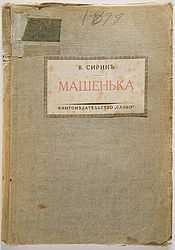Mary (novel)
| Mary | |
|---|---|
 1st edition (Russian) | |
| Author | Vladimir Nabokov |
| Original title | Машенька (Mashen'ka) |
| Translator | Vladimir Nabokov and Michael Glenny |
| Country | Russia |
| Language | Russian |
| Genre | novel |
| Publisher |
Slovo McGraw Hill (English) |
Publication date | 1926 |
Published in English | 1970 |
Mary (Russian: Машенька, Mashen'ka), is the debut novel by Vladimir Nabokov, first published under pen name V. Sirin in 1926 by the Russian language publisher "Slovo".
Plot introduction
It is the story of Lev Glebovich Ganin, a Russian émigré, displaced by the Russian Revolution. Ganin is now living in a boarding house in Berlin, where he discovers that his long-lost first love, Mary is now the wife of the rather unappealing boarder next door, and that she will be joining her husband soon. Ganin contrives a complex scheme in order to reunite with Mary, who he believes still loves him. The eponymous Mary never appears in the present of the novel, but only in Ganin's reminiscences.
Plot summary
Characters in "Mary"
Lev Glebovich Ganin
Aleksey Ivanovich Alfyorov
Lydia Nikolaevna Dorn
Lyudmila
Klara
Anton Sergeyevich Podtyagin
Mary Alfyorov
Major themes
Film, TV or theatrical adaptations
Film
A film adaptation titled Maschenka after the original Russian title, was released in 1987. The film, directed by John Goldschmidt with screenplay by John Mortimer, starred Cary Elwes as Ganin and Irina Brook as Maschenka. John Goldschmidt won the Cine De Luca Award for directing 'Maschenka" at the Monte Carlo TV Festival.
Publication history
- 1970, USA, McGraw-Hill
- 1989, USA, Vintage International ISBN 0-679-72620-9, Pub Date November 1989
English Translation and Authorial Changes
The novel first appeared in English in 1970 in a translation by Michael Glenny "in collaboration with the author." According to Nabokov, "I realized as soon as [we] started that our translation should be as faithful to the text as I would have insisted on its being had that text not been mine."[1] He further stated that "The only adjustments I deemed necessary are limited to brief utilitarian phrases in three or four pages alluding to routine Russian matters ...[and] the switch of seasonal dates in Ganin's Julian Calendar to those of the Gregorian style in general use."[2]
External links
Notes and references
- ↑ Vladimir Nabokov, Mary New York: Vintage International, 1989. p. xiv.
- ↑ Vladimir Nabokov, Mary New York: Vintage International, 1989. p. xv.
| ||||||||||||||||||||||||||||||